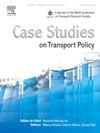CO2 emissions in urban freight transport: Developing and testing the EcoLogistics tool
IF 2.4
Q3 TRANSPORTATION
引用次数: 0
Abstract
The sixth assessment report of the Intergovernmental Panel on Climate Change (IPCC) highlighted a significant rise in global greenhouse gas (GHG) emissions, with freight transport contributing disproportionately to this increase. The escalating movement of people and goods necessitates additional measures by local governments to meet the Paris Agreement targets. However, city governments often struggle to design effective emission reduction strategies due to data limitations, multiple stakeholders, and evolving conditions. This paper presents the development of the EcoLogistics tool, a collaborative decision support system designed to aid cities in tracking urban freight transportation emissions and evaluating the impact of decarbonization strategies. The tool’s application is illustrated through a case study in Bogotá, where local officials used it to assess the city’s 2019 carbon dioxide equivalent emissions and explore alternative electrification scenarios for 2030 and 2050. The results facilitated the creation of a low-carbon urban freight action plan, emphasizing fleet electrification to reduce emissions. The Bogotá case study demonstrates the EcoLogistics tool’s potential for global applicability, showcasing its adaptability and effectiveness in enabling cities worldwide, regardless of their economic or logistical contexts, to initiate urban freight transportation decarbonization efforts.
城市货运中的二氧化碳排放:生态学工具的开发和测试
政府间气候变化专门委员会(IPCC)的第六次评估报告强调,全球温室气体(GHG)排放量显著增加,货运对这一增长的贡献不成比例。人员和货物流动的不断升级要求地方政府采取额外措施,以实现《巴黎协定》的目标。然而,由于数据限制、多方利益相关者和不断变化的条件,城市政府往往难以制定有效的减排战略。本文介绍了生态工具的开发,这是一个协同决策支持系统,旨在帮助城市跟踪城市货运排放并评估脱碳战略的影响。该工具的应用通过波哥大的一个案例研究来说明,当地官员用它来评估该市2019年的二氧化碳当量排放量,并探索2030年和2050年的替代电气化方案。研究结果促进了低碳城市货运行动计划的制定,强调车队电气化以减少排放。波哥大案例研究展示了生态物流工具在全球范围内的应用潜力,展示了其适应性和有效性,使世界各地的城市,无论其经济或物流背景如何,都能启动城市货运脱碳工作。
本文章由计算机程序翻译,如有差异,请以英文原文为准。
求助全文
约1分钟内获得全文
求助全文

 求助内容:
求助内容: 应助结果提醒方式:
应助结果提醒方式:


